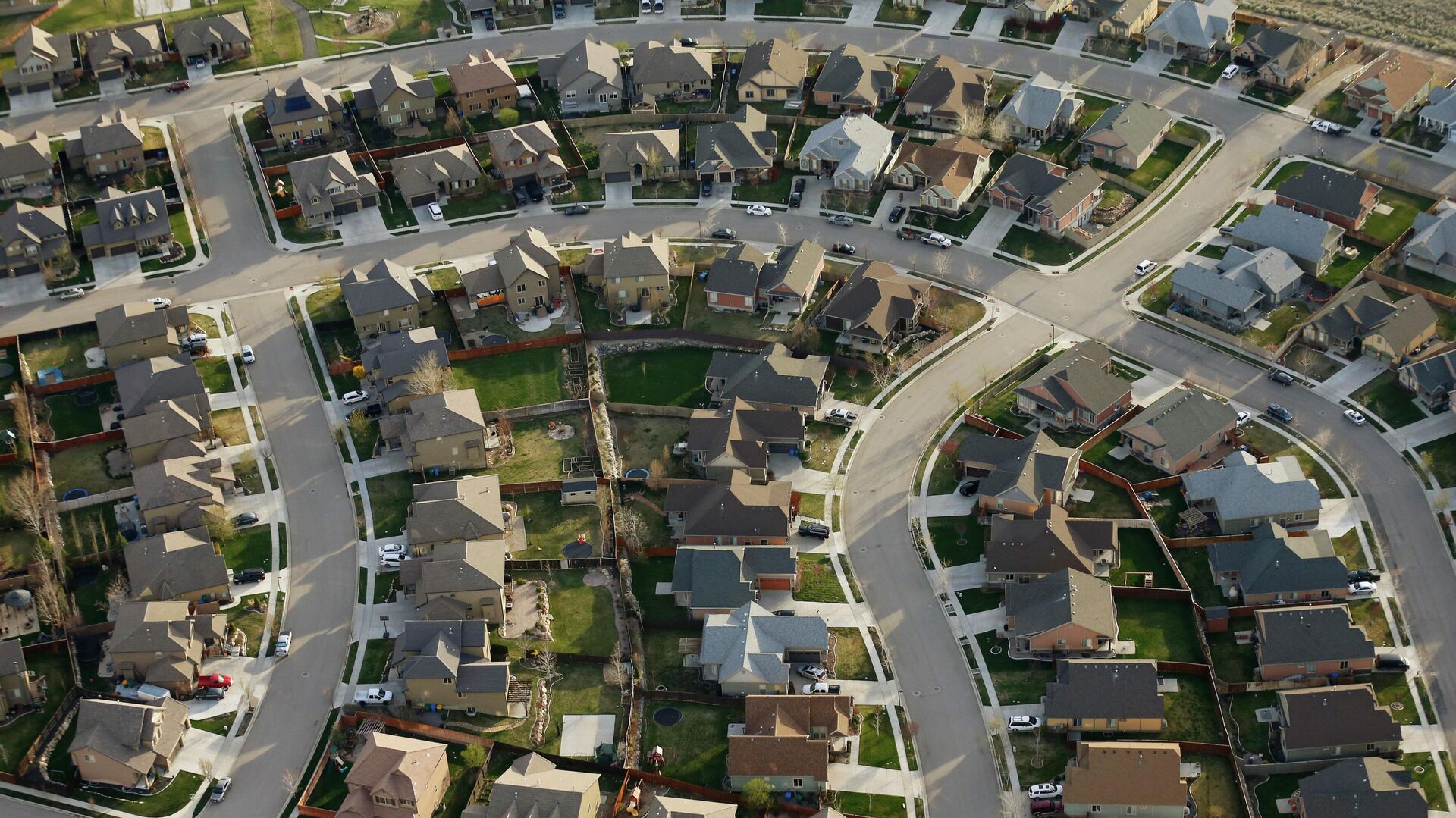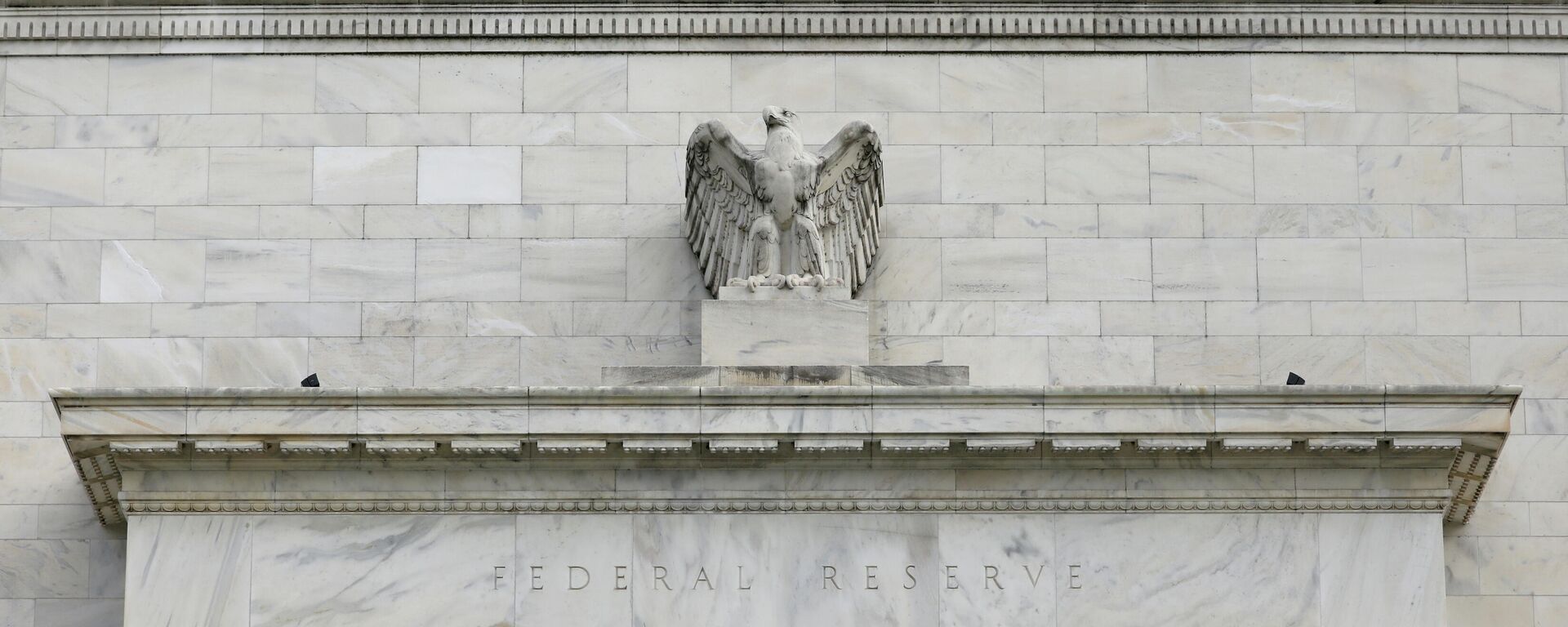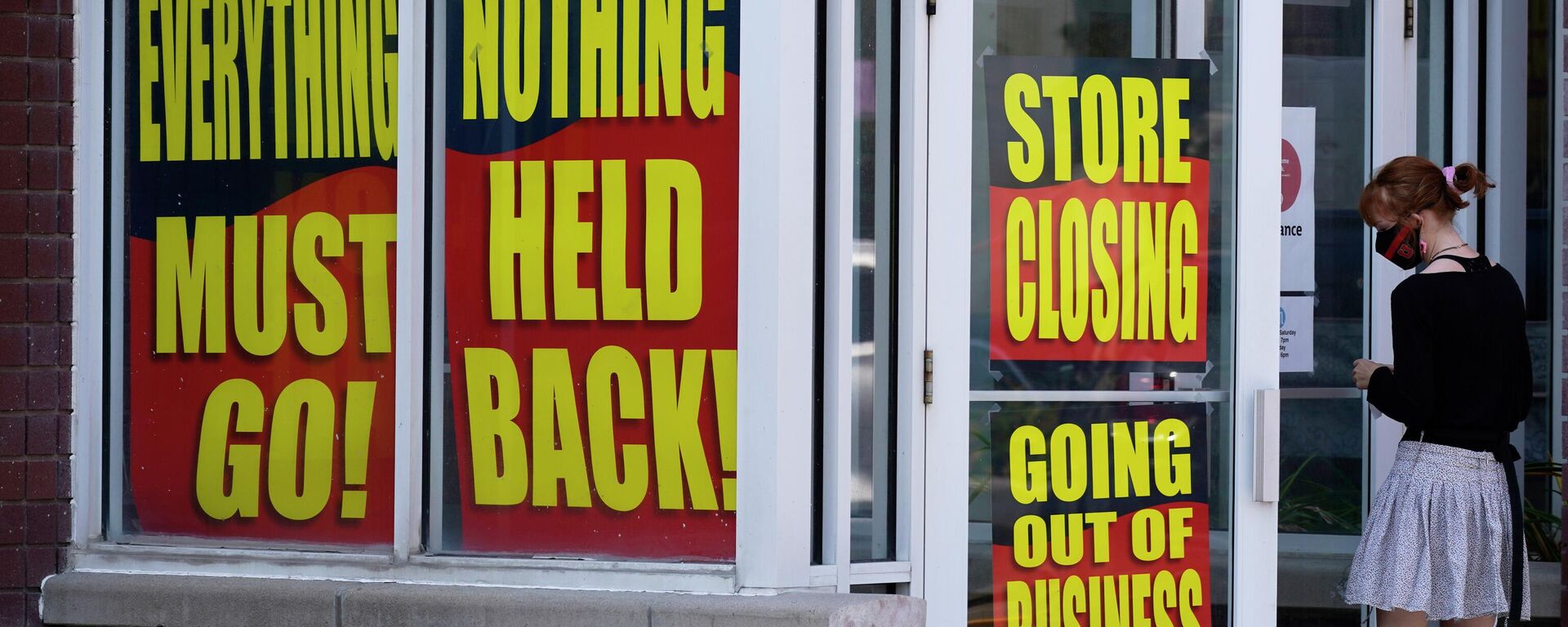https://sputnikglobe.com/20220421/us-housing-crisis-untamed-inflation-could-lead-to-recession-analysts-say-1094954235.html
US Housing Crisis, Untamed Inflation Could Lead to Recession, Analysts Say
US Housing Crisis, Untamed Inflation Could Lead to Recession, Analysts Say
Sputnik International
WASHINGTON (Sputnik) - Spiraling inflation and mortgage rates, amid a housing affordability crisis driven by low inventory, alarmingly high rents, and a drop... 21.04.2022, Sputnik International
2022-04-21T23:11+0000
2022-04-21T23:11+0000
2022-10-19T18:40+0000
us
mortgage
federal reserve
rate hikes
opinion
economy
business
https://cdn1.img.sputnikglobe.com/img/07e6/04/15/1094954209_0:0:3539:1990_1920x0_80_0_0_00aaeda58bc32686b28ab20ba53649ea.jpg
US mortgage rates hit a 12-year high last week while home prices set a new record in March, industry association data revealed on Wednesday. This comes as inflation is rising at 8.5 percent, a rate not seen in 40 years, while real wages are falling steadily every month, according to the Labor Department.On Thursday, Federal Reserve chief Jerome Powell said the central bank should move more quickly to raise interest rates even higher to curb inflation. In March, after slashing them to near zero, the Fed raised rates for the first time since the pandemic. However, a number of Fed officials have concluded that the hike was too tame to rein in inflation.The National Association of Realtors (NAR) said the median home price in March was $375,300, up 15 percent from a year ago, marking the 121th consecutive month of year-over-year increases - the longest-running streak on record. Mortgage rates increased across the board for all loan types, with the 30-year fixed rate hitting 5.2%, according to the Mortgage Banking Association (MBA).A Zillow report shows that a typical American home was worth 32.4 percent more in February than in February 2020. Also, the number of homes put up for sale in February was down by 48 percent of the pre-pandemic period two years ago.As the trend continues, less Americans can afford these prices. NAR's Housing Affordability Index, which measures the degree to which a typical family can afford the monthly mortgage payments, has dropped 20% during the 12 months ending in February.Falling inventory has stoked increasing demand and caused home prices to escalate at a robust pace, according to Zillow. Total housing inventory at the end of March totaled 950,000 units, down about 10% from one year ago when it stood at 1.05 million, according to the NAR.Another metric that illustrates the severity of the problem for homebuyers is that houses remained on the market for only 17 days in on average last month. Some 87% of homes sold were on the market for less than a month, the NAR said. In February, Zillow said the that houses went under contract in a mere 11 days nationally, which is six days faster than February 2021 and 25 days faster than in February 2020.Analysts at Zillow point to generational demographics, with a massive wave of Millennials aging into their prime home-buying years. At the same time, Baby Boomers are more active in the housing market than earlier generations. And as more workers get clarity on what their working arrangements look like, they too, will be looking to make long-term housing decisions which will have the effect of continuing demand.Georgia State University Economics and Entrepreneurship Professor Isabelle Trilbu Monlouis warned that companies enjoying record profits may opt not to drop prices if there is a recession. She said people can blame the real-estate market, gas prices, and or the supply chain issues but she also blames corporate greed.Meanwhile, Monlouis said although nominal wages are up, real wages are down.Monlouis said people need to mind their credit card debt and loans with high interest and take that leap to a new job while the market is still hot."HR processes have difficulty keeping up with market realities. Most companies won’t give you a raise big enough to cover the sustained cost of inflation. And if they do it once, they will consider having done you a favor while your real wage is still down," Monlouis said.
https://sputnikglobe.com/20220419/us-economy-to-do-well-even-with-federal-reserves-interest-rate-hikes---fed-officials-1094896972.html
https://sputnikglobe.com/20220420/us-businesses-managing-inflation-by-passing-on-costs-to-consumers-fed-beige-book-says-1094922480.html
Sputnik International
feedback@sputniknews.com
+74956456601
MIA „Rossiya Segodnya“
2022
Sputnik International
feedback@sputniknews.com
+74956456601
MIA „Rossiya Segodnya“
News
en_EN
Sputnik International
feedback@sputniknews.com
+74956456601
MIA „Rossiya Segodnya“
Sputnik International
feedback@sputniknews.com
+74956456601
MIA „Rossiya Segodnya“
us, mortgage, federal reserve, rate hikes, opinion, business
us, mortgage, federal reserve, rate hikes, opinion, business
US Housing Crisis, Untamed Inflation Could Lead to Recession, Analysts Say
23:11 GMT 21.04.2022 (Updated: 18:40 GMT 19.10.2022) WASHINGTON (Sputnik) - Spiraling inflation and mortgage rates, amid a housing affordability crisis driven by low inventory, alarmingly high rents, and a drop in real wages, could lead to a recession, experts told Sputnik.
US mortgage rates hit a 12-year high last week while home prices set a new record in March, industry association data revealed on Wednesday. This comes as inflation is rising at 8.5 percent, a rate not seen in 40 years, while real wages are falling steadily every month, according to the Labor Department.
On Thursday, Federal Reserve chief Jerome Powell said the central bank should move more quickly to raise interest rates even higher to curb inflation. In March, after slashing them to near zero, the Fed raised rates for the first time since the pandemic. However, a number of Fed officials have concluded that the hike was too tame to rein in inflation.
"Inflation has affected the housing market in a lot of ways," Redfin Chief Economist Daryl Fairweather told Sputnik. "There’s extra money floating around, the feds have raised interest rates and mortgage rates have increased. The scenario at the current pace will be increased interest rates, higher prices, and a possible recession, not most likely but not impossible."
The National Association of Realtors (NAR) said the median home price in March was $375,300, up 15 percent from a year ago, marking the 121th consecutive month of year-over-year increases - the longest-running streak on record. Mortgage rates increased across the board for all loan types, with the 30-year fixed rate hitting 5.2%, according to the Mortgage Banking Association (MBA).
A Zillow report shows that a typical American home was worth 32.4 percent more in February than in February 2020. Also, the number of homes put up for sale in February was down by 48 percent of the pre-pandemic period two years ago.
As the trend continues, less Americans can afford these prices. NAR's Housing Affordability Index, which measures the degree to which a typical family can afford the monthly mortgage payments, has dropped 20% during the 12 months ending in February.
Falling inventory has stoked increasing demand and caused home prices to escalate at a robust pace, according to Zillow. Total housing inventory at the end of March totaled 950,000 units, down about 10% from one year ago when it stood at 1.05 million, according to the NAR.
Another metric that illustrates the severity of the problem for homebuyers is that houses remained on the market for only 17 days in on average last month. Some 87% of homes sold were on the market for less than a month, the NAR said. In February, Zillow said the that houses went under contract in a mere 11 days nationally, which is six days faster than February 2021 and 25 days faster than in February 2020.
Analysts at Zillow point to generational demographics, with a massive wave of Millennials aging into their prime home-buying years. At the same time, Baby Boomers are more active in the housing market than earlier generations. And as more workers get clarity on what their working arrangements look like, they too, will be looking to make long-term housing decisions which will have the effect of continuing demand.
Georgia State University Economics and Entrepreneurship Professor Isabelle Trilbu Monlouis warned that companies enjoying record profits may opt not to drop prices if there is a recession. She said people can blame the real-estate market, gas prices, and or the supply chain issues but she also blames corporate greed.
"While the Fed will increase interest rates to cool the real estate market and slow the easy access to money, it is uncertain whether companies that will have ascertained that the market can bear a certain price, will drop their prices down. For example, airlines introduced baggage fees to combat the Great Recession of 2008 and high gas prices but they never went away, right?" Monlouis told Sputnik.
Meanwhile, Monlouis said although nominal wages are up, real wages are down.
"So we have folks who have been working harder these past two-three years and they are essentially making less. Significantly less. That’s critical for folks who were already living paycheck-to-paycheck," Monlouis said.
Monlouis said people need to mind their credit card debt and loans with high interest and take that leap to a new job while the market is still hot.
"HR processes have difficulty keeping up with market realities. Most companies won’t give you a raise big enough to cover the sustained cost of inflation. And if they do it once, they will consider having done you a favor while your real wage is still down," Monlouis said.




